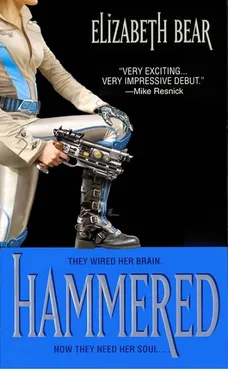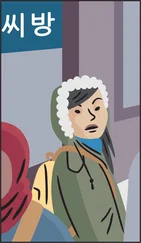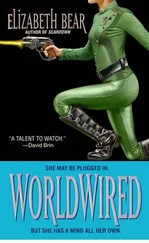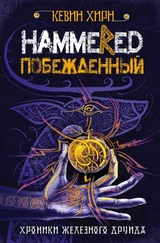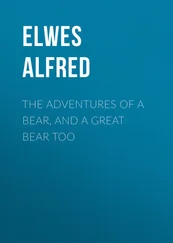Her cup rattled on the table when she set it aside. “All right, Dick,” she told him. “You got me. You’re not Feynman. So tell me what the hell you are.”
“I don’t know,” he said carefully.
Elspeth Dunsany grinned hard. “Postulate, Dick.”
His hands tapped his knee, restless, seeking. “I have always held reliance on paranormal explanations to indicate a lazy mind. But I sure as hell feel like Dick Feynman.” He shrugged. “Even though Richard Feynman is dead. So I’m left with interesting gaps in my logic.”
Elspeth raised an eyebrow inside her VR suit. Her image mimicked the motion. “How did you find out that you were dead?” she asked him.
He held out a portfolio. “I found the library. These clippings were in there. Along with more information about my compatriots — and myself — than I ever imagined existed.” He sighed. “It’s a shame that I never got to Tanna-Tuva.”
Allen-Shipman Research Facility
St. George Street
Toronto, Canada
Late morning, Monday 11 September, 2062
Gabe Castaign moved his long-fingered right hand through the three-dimensional interface, directing data streams with thoughtless dexterity. With the left one, not looking, he flipped open a box of mints and picked one out, sucking it off of his fingertips. Elspeth, leaning over his shoulder, caught a sharp scent of wintergreen. “May I have one of those?”
“Sure.” He slid the tin into reach. “My kids made a big deal about how much I smelled like garlic when I got home last night. I figured I’d take pity on you.”
“Kids?” They’d had dinner again the night before — Sunday dinner. Thinking of garlic and indulging, Elspeth took two of the hard little candies, wincing at their strength.
“Girls,” he said with a grin. Still without glancing away from his monitor plate, he touched another icon. The interface plate shimmered, and a hologram of two golden-haired adolescents materialized over the far left corner of the desk. One was perhaps thirteen, the other ten or eleven. The taller girl leaned smiling into her sister, an arm around her shoulders; the younger one seemed taut and focused, leaning toward the camera. The younger had eyes as blue as her father’s. Those of the older were gray-green.
“That’s Leah, after my mom. The younger one’s Genie. She’s named after my wife.”
“How long have you been married?” Elspeth almost laughed out loud at herself, pleased she managed not to let disappointment show in her voice. He did mention that before, but I assumed…
He leaned back. Elspeth smelled warmly spicy aftershave. “We were married four years,” he said. “Leukemia. I raised the girls on my own, more or less.” He glanced away, frowning, and tapped the image down. “Do you have any kids?”
“Married to my work,” she said. “And then I went to jail. Not much conducive.”
A rough-edged silence stretched between them, punctuated by the crunch of Gabe chewing on his breath mint. He broke first. “So how do you get your artificial personalities to be more than really complicated chatter-bots?”
“Turing test stuff?” She shrugged and stepped around the desk, so she could speak to him from the front. And, incidentally, control her urge to lean against his shoulder. “Well, you don’t, really. No, that’s wrong.” Her hands tumbled over one another in midair. “They’re exactly like really complicated chatter-bots. You just keep adding layers and layers of complexity and information and reactions and algorithms until you get to these very complex multifaceted variables.”
“Tolbert equations.”
“Yes. And you give it all the memory you have, and put it into a series of increasingly complex situations.”
“And then?” Gabe’s hands slowly stopped moving, hanging amid the jeweled lights of his interface. His brow furrowed and he looked up at Elspeth, meeting her gaze directly.
“And then one day it either wakes up or it doesn’t.”
“Oh.” He didn’t say anything for a moment, looking back down at his carefully trimmed fingernails. “That’s not mighty scientific, Doc. How do we know that it works?”
“Because it works.” She shrugged. “Sometimes. And why it works sometimes and not others… hell, your guess is as good as mine.”
“What if I pointed a gun at you and told you, ‘I need an answer’? Hypothetically speaking, of course.”
Her hands spread wide. “Dammit, Gabe. I’d say it comes down to will to live.”
“You sound like you have something specific in mind.”
She nodded. “Let’s go for a walk, shall we?”
He grabbed his jacket and followed her out the door.
The lab and offices sat on a little green oblong not far from the University of Toronto, where Elspeth had taught in the days before she found herself in jail. There was a coffee shop on every third corner, and the familiar street names were like a homecoming. She breathed in the late summer air, slinging a sweater retrieved from her office over one shoulder. It had rained overnight, but the humidity was rising with the sun, and the day promised heat.
Gabe was taking his jacket off again. “You know, September, I keep thinking it ought to be cooler.”
She shrugged. “It’s not even really autumn yet.”
“True.” His voice dropped. “Okay, so what was so important you didn’t want to tell me about it indoors?”
“Ah. Well.” She scuffed concrete with the sole of a loafer. “Richard Feynman, frankly.”
“The physicist? One of your original five artificial personalities.”
“Yes.” She reached up to swat at a dangling leaf. He grinned, and she blushed. “More than that.”
“Oh?”
The conversation was interrupted as they arrived at the coffee shop, and Gabe ordered just plain coffee. Elspeth got a cappuccino with extra whipped cream. They took the drinks outside and sat at a blackened aluminum table meant to look like cast iron. Elspeth took a long sip of her drink and watched Gabe fuss with cream and sugar. Is this someone you can trust? Well, you’re not telling him anything Valens doesn’t already suspect. “He’s the one that worked. Developed awareness. Became… a person.”
“Ah hah.” His voice was neutral, interested. “That’s quite a judgment call, Elspeth. What do you base it on?”
She felt gratitude. “Once we were engaging in ontological discussion on the nature of consciousness, it was hard to deny his point. I remember once, I told him that he was nothing but electrical impulses in crystal, and he came back that I was the same thing in meat. It was a hard point to argue.”
“What happened to him?” Gabe leaned forward. “Why aren’t we using those records?”
Elspeth laughed. “That’s why I went to jail, more or less. I wouldn’t give him up.”
“Give him up? To whom?”
She nodded and played with her paper cup. “Valens wanted my work for the army. For the war effort. I deleted my most recent backups. Was going to erase Richard, too.”
“And did you?”
“I…” her voice trailed off. “I gave him an Internet connection and bought him some time. I hope he made it. I don’t know.”
“Ah.”
“The colonel was not amused. Especially after my research partner broke a soldier’s nose with a printer stand.” She grinned at Gabe’s startled laughter. “That was Jack Taylor. I made him turn state’s evidence against me. He had a wife.”
His laughter trailed off. “And then you went to jail for over a decade.”
“Indeed. I never did tell them that I didn’t delete all those records. The ones we’ve been working from are earlier backups.” She pushed her chair back and stood up, picking up her nearly full cup before he could ask the question forming in his eyes.
Читать дальше
